
Factory farming conditions and antibiotic-resistant pathogens emerging as a result of them pose an existential threat to humans in the form of zoonotic diseases. Why it’s time to produce and consume food more thoughtfully.
Water fluoridation is one of the top ten public health achievements of the 20th century according to the US Centers for Disease Control, but long-term studies show that fluoride may cause negative health effects. Most of Europe has rejected this practice, and while 25 countries have water fluoridation programmes, more people drink artificially fluoridated water
Water fluoridation is one of the top ten public health achievements of the 20th century according to the US Centers for Disease Control, but long-term studies show that fluoride may cause negative health effects. Most of Europe has rejected this practice, and while 25 countries have water fluoridation programmes, more people drink artificially fluoridated water in the US than all other countries combined.
Fluoride, often used in pesticides and rodenticides, is the only chemical added to treat people who drink water and not the water itself. Since its function is to prevent tooth decay, a disease, the US Food and Drug Administration considers it medicine. This is why opponents describe its widespread use as a form of mass medication. It is not an essential nutrient and has long been known to be toxic. The most commonly used fluoride additives are silicofluorides: unpurified, industrial byproducts of the fertilizer industry, very different from the fluoride salts used in toothpaste and other dental products which must themselves carry a poison warning.
The US Government is now recommending lower levels of fluoride in water, a decision possibly prompted by recent large-scale studies that show a rapid decline in tooth decay rates in Western countries that treat water using fluoridation as well as those that don’t. Harvard University’s Dr. Grandjean advocates using it topically, for example in tooth brushing, as opposed to swallowing the chemical and subjecting all of the body’s organs to it since fluoride doesn’t need to be ingested to be effective. He also believes there is a reasonable concern that it can affect brain development and reduce IQ. Research suggests a link between fluoridation and attention deficit hyperactivity disorder, the painful bone disease skeletal fluorosis, the tooth enamel defect dental fluorosis and other health complications.
Even deep well water with naturally occurring high levels of fluoride is dangerous and has adversely affected the health of tens of millions of people consuming it in India. Thankfully most fresh, unpolluted water supplies contain very low levels of the chemical. If you’re worried about overexposure to it choose filtered, distilled or spring water and consume local, organically grown food. In addition, the Fluoride Action Network (FAN), a non-profit organization based in the US state of New York, has been trying to end water fluoridation around the globe since 2000. Its website offers up-to-date recommendations and answers many questions consumers may have.
Siamo anche su WhatsApp. Segui il canale ufficiale LifeGate per restare aggiornata, aggiornato sulle ultime notizie e sulle nostre attività.
![]()
Quest'opera è distribuita con Licenza Creative Commons Attribuzione - Non commerciale - Non opere derivate 4.0 Internazionale.
Factory farming conditions and antibiotic-resistant pathogens emerging as a result of them pose an existential threat to humans in the form of zoonotic diseases. Why it’s time to produce and consume food more thoughtfully.
The world of cinema recognises the link between food choices and the climate crisis by offering vegan menus for awards season events, including at the most important of them all: the Oscars.
Let’s look at the reasons behind the growth of veganism in India, as a small yet vocal section of the population turns towards this diet and lifestyle in the largest milk producing country in the world.
by Jeffrey Y. Campbell, Manager of the Forest and Farm Facility at FAO In the Ecuadorian Amazon, Kichwa farmers grow dozens of products on tiny parcels of land. Their lands hum with biodiversity, yielding nutritious foods that have sustained families for generations. Wandering among fruit and nut trees and crops, these indigenous agroforesters fill their baskets
Mint has many health benefits, but in food it’s often accompanied by artificial green colourings. Instead, Galatea has created a green mint ice cream in a completely natural way.
We’re talking about Galatea, a company that produces semi-finished products for artisanal ice creams using high quality ingredients, natural colouring, excluding thickeners and hydrogenated fats, respecting the environment and supporting the less fortunate.
The mad rush to fake food, like fake meat made with genetically-modified soy, ignores the importance of the diversity of our foods and culinary cultures. It’s a recipe to accelerate the destruction of the Planet and our health.
Like with all foods, the quality of an ice cream can be discerned by reading its label. An expert explains how to do this, and tells us how their company steers clear of chemicals, using only natural ingredients to produce an excellent and “free” ice cream.
Quality ingredients, no artificial colouring and hydrogenated fats. These are the main features of a great ice cream. But what makes an ice cream parlour “good”, i.e. sustainable?








